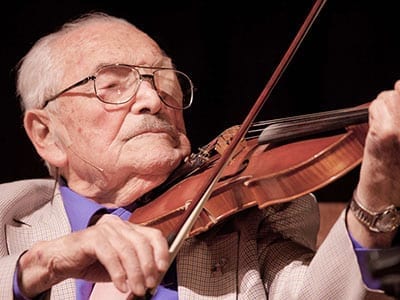
ABE METH
Teacher, Musician, Husband, Father, And Hungarian Holocaust Survivor
Abe Meth was born on June 3, 1912 in Budapest, Hungary during a time of relative peace and tranquility. His father, Kalman, was an experienced jeweler, and his mother, Serena, was a homemaker who also sold eggs six days a week at the local market. Abe was the oldest of five children with two younger brothers, David and Israel, and two younger sisters, Gizella and Klara. For Abe his youth was filled with fond memories of strolls along the city boulevards and attending the theater and opera with his father.
Abe demonstrated a talent for music and, at the age of eight, convinced his father to buy him a violin – an instrument that Abe continues to play to this day at the age of 100. After finishing elementary and middle school, Abe entered the Teaching Institute of the Jewish Theological Seminary, hoping to qualify for a teaching position in a Jewish school. In 1933, at the age of 21, Abe graduated from the Teacher’s Institute and began to earn a living by tutoring students and playing his violin in a dance band on Saturday nights.
When Hitler became Chancellor of Germany in 1933, Abe realized that he must prepare himself for a possible escape from Europe, preferably to Canada or America. To that end, Abe purchased a Berlitz language book and record and feverishly began to teach himself English. With time, Abe became proficient in English, a skill that would ultimately provide an exit for he and his family from Europe.
If it was English that eventually saved Abe, it was his persistence in the pursuit of obtaining Hungarian citizenship that made his ultimate survival possible. Although Jews had lived among the Hungarians for centuries, few Jews ever obtained the status of being an official citizen of Hungary. Abe recognized that although Hungarians despised the Jews, obtaining Hungarian citizenship would provide his family with some protection should anti-Semitism become a threat to their life. After years of bribing Hungarian officials at the cost of all their cash and gold, finally Abe and his family were declared Hungarian citizens.
In 1935 Abe met his future wife, Lillie Lenke, at the Jewish festival called Purim, a type of costume ball celebrating Queen Esther’s saving of the Jews from Haman. Abe fell in love and on February 26, 1939, just six months before war broke out in Europe, they were married in Budapest. Despite the threat of war they decided: “What will be will be. We will face the future together.”
In 1940, with Hungary now an ally of Nazi Germany, Hungarian officials began to ‘round up’ and deport the Jews to concentration camps, eventually sentencing more than 400,000 to their deaths. Among those killed were 19 of Abe’s relatives. Only their Hungarian citizenship saved Abe and his immediate family from a similar fate. Abe’s premonition that citizenship would be important saved the lives of those he loved, allowing them to survive. Although Abe was not deported to a Nazi concentration camp, he was conscripted to work in various labor camps under Hungarian control.
In 1942 at the height of the war, Lillie told Abe: “I would like to have a baby.” Abe asked incredulously: “Do you not know there is a war going on, that people are dying by the thousands. Why would you want another one to die.” To which Lillie replied: “My baby would make my life more valuable. It will give me strength to fight for life.” And in 1943 Lille gave birth to their son, Joseph, and with his birth Lillie’s determination to survive was forged.
In 1944 the relatively stable situation in Hungary radically changed when the Nazi Army took control of the Hungarian government and with the help of Hungarian collaborators set out to annihilate the remaining 200,000 Jews in Budapest. Being on a work detail or being a Hungarian citizen could not save Abe and his family from the Nazis and certain death – their fate seemed sealed. But a mild mannered Swedish diplomat named Raoul Wallenberg changed that fate.
Not long after arriving in Budapest Wallenberg issued protective Swedish documents to many of the Jews of Budapest and then housed them in apartment buildings under Swedish diplomatic protection. Abe, Lillie, son Joseph, and Abe’s parents along with one sister and one brother were chosen to live at one of these apartments and did so until the Russian Army liberated Budapest in January of 1945 – thus rescuing the surviving Jews from the Nazis.
In 1946 Abe used his knowledge of the English language to become an interpreter for a Hungarian Agricultural delegation to the United States. Upon arriving in the United States Abe contacted a Rabbi at the Queens Jewish Community Center who helped Abe acquire the necessary visas to immigrate to America. In February 1948 Abe, Lillie, Joseph, and newly born daughter, Agi boarded a ship in Le Havre, France for New York. Not long after arriving in the United States Abe took a job with Beth Shalom Synagogue in Kansas City – a job Abe dedicated himself to for 30 years.
In 1978, Abe and Lillie retired to Sun City, Arizona. Never one to be inactive, Abe became the Torah reader at Beth El congregation in Phoenix for Saturdays and holidays – a position he held for 32 years. Lillie died in 2010 at the age of 97. Abe’s son, Joseph became a successful businessman and is now retired in Florida. His daughter, Agi, is a nurse practitioner in the Phoenix area.
